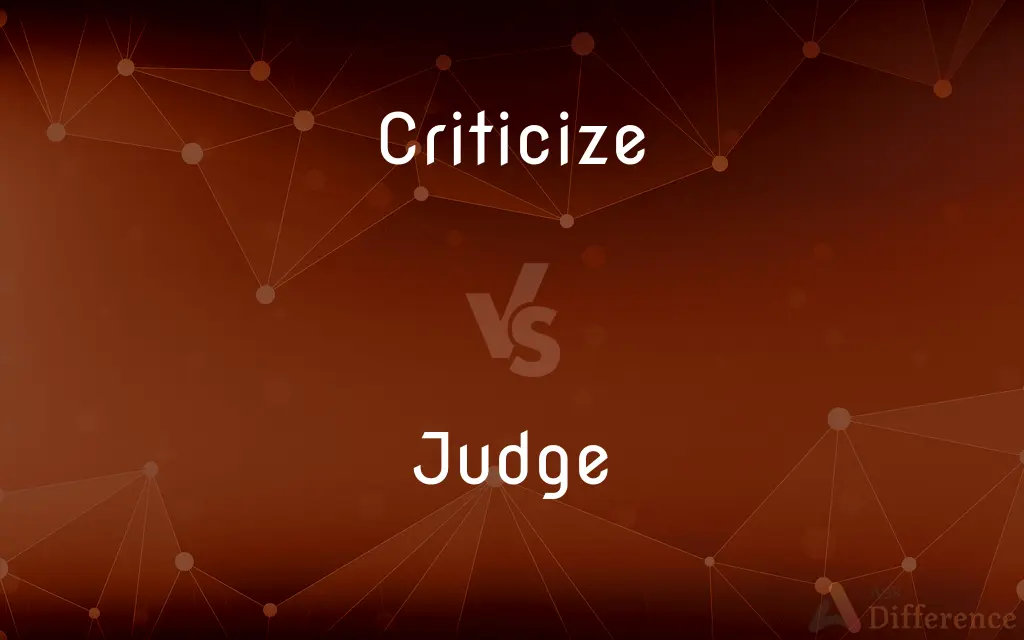Criticize vs. Judge — What's the Difference?
By Maham Liaqat & Urooj Arif — Updated on March 31, 2024
Criticize involves expressing disapproval, while judging involves forming an opinion or conclusion.

Difference Between Criticize and Judge
Table of Contents
ADVERTISEMENT
Key Differences
Criticizing is the act of pointing out faults or expressing disapproval towards someone or something based on perceived mistakes or flaws. It often implies a negative assessment and can focus on improvement or merely highlight shortcomings. Judging, on the other hand, entails forming an opinion or evaluation about someone or something. This process can be positive, negative, or neutral, depending on the criteria used and the context.
While criticism is specifically targeted towards identifying faults or areas of improvement, judging encompasses a broader scope, including assessing character, actions, or work based on various standards or criteria. A person can judge something to be good, bad, or somewhere in between, whereas criticism tends to lean towards the negative.
Criticism can be constructive or destructive. Constructive criticism is aimed at providing feedback that can lead to improvement, suggesting that while there are faults, there is also a path to betterment. Judging, especially in formal contexts like competitions or legal settings, involves a more definitive conclusion based on evidence or standards, which may not include suggestions for improvement.
The intent behind criticizing often revolves around the desire to see change or improvement, whether it's delivered in a helpful or harmful manner. When judging, the intent can be more about making a decision or forming an opinion rather than influencing change. For example, a judge in a court makes decisions based on law and evidence without necessarily aiming to improve the parties involved.
The impact of criticizing versus judging can also differ. Criticism, especially if perceived as unjust or harsh, can lead to defensiveness or negative feelings. Judging, depending on the context and manner, can be accepted as a necessary conclusion or evaluation of behavior, actions, or work, and may not elicit as strong an emotional response if perceived as fair or objective.
ADVERTISEMENT
Comparison Chart
Definition
Expressing disapproval based on perceived faults.
Forming an opinion or conclusion about something.
Scope
Often negative, focusing on faults or areas for improvement.
Can be positive, negative, or neutral.
Intent
Aimed at highlighting faults, possibly to encourage improvement.
Aimed at evaluating or making a decision.
Outcome
Can lead to improvement if constructive.
Leads to a decision or opinion formation.
Emotional Impact
Often received defensively or negatively.
Can be accepted if perceived as fair, causing less emotional distress.
Compare with Definitions
Criticize
Aims to highlight areas that need change or betterment.
The coach criticized the player's technique to improve his performance.
Judge
Involves evaluating something based on certain standards or criteria.
The jury will judge the defendant's guilt or innocence.
Criticize
Involves pointing out errors or flaws in someone or something.
The editor criticized the manuscript for its lack of clarity.
Judge
Often results in a conclusion or decision, not necessarily aimed at improvement.
The panel judged his performance to be the best.
Criticize
Targets specific aspects rather than making a general assessment.
She criticized the proposal for its unrealistic budget estimates.
Judge
Applies to both formal settings (courts, competitions) and everyday opinions.
The chef judged the dish to be perfectly seasoned.
Criticize
Often perceived negatively, as it focuses on shortcomings.
The review criticized the film more harshly than expected.
Judge
Can assess overall quality, character, or actions.
We shouldn't judge a book by its cover.
Criticize
Can be aimed at helping improve or merely pointing out faults.
Constructive criticism helped refine her skills.
Judge
Can be based on objective criteria or personal bias.
He was unfairly judged based on rumors.
Criticize
To find fault with
Criticized the decision as unrealistic. See Usage Note at critique.
Judge
A judge is a person who presides over court proceedings, either alone or as a part of a panel of judges. The powers, functions, method of appointment, discipline, and training of judges vary widely across different jurisdictions.
Criticize
To judge the merits and faults of; analyze and evaluate
Criticizes art for a living.
Judge
To form an opinion or estimation of after careful consideration
Judge heights.
Judging character.
Criticize
To act as a critic.
Judge
(Law) To hear and decide on in a court of law
Judge a case.
Criticize
To find fault (with something).
They criticized him for endangering people's lives.
Judge
To pass sentence on; condemn.
Criticize
To evaluate (something), assessing its merits and faults.
Judge
To act as one appointed to decide the winners of
Judge an essay contest.
Criticize
Same as criticise; as, The paper criticized the new movie.
Judge
To determine or declare after consideration or deliberation
Most people judged him negligent in performing his duties as a parent.
Criticize
Find fault with; express criticism of; point out real or perceived flaws;
The paper criticized the new movie
Don't knock the food--it's free
Judge
(Informal) To have as an opinion or assumption; suppose
I judge you're right.
Criticize
Act as a critic;
Those who criticize others often are not perfect, either
Judge
(Bible) To govern; rule. Used of an ancient Israelite leader.
Judge
To form an opinion or evaluation.
Judge
To act or decide as a judge.
Judge
One who makes estimates as to worth, quality, or fitness
A good judge of used cars.
A poor judge of character.
Judge
(Law) A public official who hears and decides cases brought in court.
Judge
(Law) A public official who hears and decides cases or matters in a forum other than a court, such as an administrative proceeding.
Judge
One appointed to decide the winners of a contest or competition.
Judge
Judges (used with a sing. verb) See Table at Bible.
Judge
A public official whose duty it is to administer the law, especially by presiding over trials and rendering judgments; a justice.
Judge
A person who decides the fate of someone or something that has been called into question.
Judge
A person officiating at a sports event, a contest, or similar.
At a boxing match, the decision of the judges is final.
Judge
A person who evaluates something or forms an opinion.
She is a good judge of wine.
They say he is a poor judge of character considering all the unreliable friends he has made.
Judge
A shophet, a temporary leader appointed in times of crisis in ancient Israel.
Judge
(transitive) To sit in judgment on; to pass sentence on (a person or matter).
A higher power will judge you after you are dead.
Judge
(intransitive) To sit in judgment, to act as judge.
Justices in this country judge without appeal.
Judge
(transitive) To judicially rule or determine.
Judge
To sentence to punishment, to judicially condemn.
He was judged to die for his crimes.
Judge
To award judicially; to adjudge.
Judge
(transitive) To form an opinion on; to appraise.
I judge a man’s character by the cut of his suit.
Judge
To constitute a fitting appraisal or criterion of; to provide a basis for forming an opinion on.
Judge
(intransitive) To arbitrate; to pass opinion on something, especially to settle a dispute etc.
We cannot both be right: you must judge between us.
Judge
(transitive) To have as an opinion; to consider, suppose.
I judge it safe to leave the house once again.
Judge
(ambitransitive) To form an opinion; to infer.
I judge from the sky that it might rain later.
Judge
(ambitransitive) To criticize or label another person or thing.
Judge
(ambitransitive) To govern as biblical judge or shophet (over some jurisdiction).
Judge
A public officer who is invested with authority to hear and determine litigated causes, and to administer justice between parties in courts held for that purpose.
The parts of a judge in hearing are four: to direct the evidence; to moderate length, repetition, or impertinency of speech; to recapitulate, select, and collate the material points of that which hath been said; and to give the rule or sentence.
Judge
One who has skill, knowledge, or experience, sufficient to decide on the merits of a question, or on the quality or value of anything; one who discerns properties or relations with skill and readiness; a connoisseur; an expert; a critic.
A man who is no judge of law may be a good judge of poetry, or eloquence, or of the merits of a painting.
Judge
A person appointed to decide in a trial of skill, speed, etc., between two or more parties; an umpire; as, a judge in a horse race.
Judge
One of the supreme magistrates, with both civil and military powers, who governed Israel for more than four hundred years.
Judge
The title of the seventh book of the Old Testament; the Book of Judges.
Judge
To hear and determine, as in causes on trial; to decide as a judge; to give judgment; to pass sentence.
The Lord judge between thee and me.
Father, who art judgeOf all things made, and judgest only right!
Judge
To compare facts or ideas, and perceive their relations and attributes, and thus distinguish truth from falsehood; to determine; to discern; to distinguish; to form an opinion about.
Judge not according to the appearance.
She is wise if I can judge of her.
Judge
To hear and determine by authority, as a case before a court, or a controversy between two parties.
Judge
To examine and pass sentence on; to try; to doom.
God shall judge the righteous and the wicked.
To bring my whole cause 'fore his holiness,And to be judged by him.
Judge
To arrogate judicial authority over; to sit in judgment upon; to be censorious toward.
Judge not, that ye be not judged.
Judge
To determine upon or deliberation; to esteem; to think; to reckon.
If ye have judged me to be faithful to the Lord.
Judge
To exercise the functions of a magistrate over; to govern.
Make us a king to judge us.
Judge
A public official authorized to decide questions bought before a court of justice
Judge
An authority who is able to estimate worth or quality
Judge
Determine the result of (a competition)
Judge
Form an opinion of or pass judgment on;
I cannot judge some works of modern art
Judge
Judge tentatively or form an estimate of (quantities or time);
I estimate this chicken to weigh three pounds
Judge
Pronounce judgment on;
They labeled him unfit to work here
Judge
Put on trial or hear a case and sit as the judge at the trial of;
The football star was tried for the murder of his wife
The judge tried both father and son in separate trials
Common Curiosities
How can one respond constructively to criticism?
Responding constructively involves listening to the feedback, considering its validity, and determining how to use it for improvement.
Can criticism be positive?
While criticism is generally viewed as negative, constructive criticism is intended to be helpful and encourage improvement.
How can one give constructive criticism?
To give constructive criticism, focus on specific issues, suggest improvements, and deliver feedback in a supportive and respectful manner.
What is the main difference between criticize and judge?
Criticizing focuses on expressing disapproval by highlighting faults, while judging involves forming an overall opinion or conclusion, which can be positive, negative, or neutral.
Is judging always negative?
No, judging can lead to positive, negative, or neutral conclusions based on the evaluation of criteria or evidence.
What is the value of being judged in a competition?
Being judged in a competition provides an opportunity for feedback, learning, and understanding how one's efforts are perceived against set standards.
How does culture influence the perception of criticism and judgment?
Cultural norms and values can influence how criticism and judgment are perceived, delivered, and received, with some cultures placing a higher emphasis on harmony and indirect feedback.
Why is it important to be careful when judging others?
Being careful is important because judgments can be based on incomplete information, biases, or misunderstandings, potentially leading to unfair conclusions or harm.
Can criticism affect relationships?
Yes, criticism, especially if frequent or delivered harshly, can strain relationships, causing resentment or defensiveness.
What role does judging play in decision-making?
Judging is crucial in decision-making as it involves evaluating options or actions based on criteria to make informed choices.
Can criticism lead to positive change?
Yes, when criticism is constructive and well-received, it can be a powerful motivator for personal or professional growth.
How do societal norms affect the practice of criticizing and judging?
Societal norms can dictate the appropriateness, manner, and frequency of criticism and judgment, influencing how openly and directly feedback is given.
Is it possible to judge something without criticizing it?
Yes, it's possible to judge something by forming an opinion or conclusion without necessarily criticizing it, especially in cases where the judgment is positive or neutral.
What is the psychological impact of being frequently criticized or judged?
Frequent criticism or judgment can lead to decreased self-esteem, anxiety, and a feeling of inadequacy, especially if it's perceived as personal or unjust.
How can one improve their resilience to criticism and judgment?
Improving resilience involves developing a positive self-image, understanding the intent behind feedback, learning from it, and not taking criticism personally.
Share Your Discovery

Previous Comparison
Fjord vs. Sound
Next Comparison
Tamarin vs. TamarindAuthor Spotlight
Written by
Maham LiaqatCo-written by
Urooj ArifUrooj is a skilled content writer at Ask Difference, known for her exceptional ability to simplify complex topics into engaging and informative content. With a passion for research and a flair for clear, concise writing, she consistently delivers articles that resonate with our diverse audience.














































